Mike Belk outlines Mercedes-Benz Truck’s vision of the future – zero accidents, zero emissions and zero inefficiency – and parent Daimler is investing £2.2bn to achieve it.
The logistics and distribution industry is set to transform dramatically in the next few years, according to Mike Belk, managing director of Mercedes-Benz Trucks.
The industry has been presented with a huge opportunity that could see improved efficiency and reduced costs, he says.
Belk (below) outlined Mercedes-Benz Trucks’ vision for the future at the company’s Road Efficiency Live event at Millbrook Proving Ground in April, sharing the manufacturer’s views on how dealers and customers could maximise their benefits from changes that are developing rapidly.
“Our vision of the future is zero accidents, zero emissions, and zero inefficiency. Although this is an ambitious target, we see the ability to move toward it.
"Daimler is investing €8 billion (£7bn) to achieve this, and €2.5bn (£2.2bn) of that is for Mercedes-Benz Trucks to achieve it,” he said.
“Some of the technology we’re developing will address how the logistics business is evolving.”
Belk referred to a report in the Economist that names seven technology tipping points that we would pass by 2030.
He said robotics would be disrupting white-collar jobs, forcing industries to adapt.
A proliferation of sensors will allow the ‘internet of things’ to develop with a trillion objects connected by 2022.
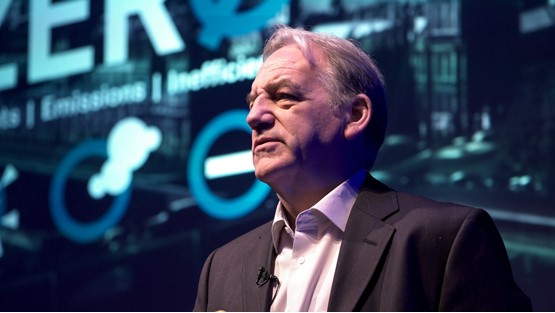
In medicine, 3D printing will enable less costly and more efficient reproduction of body parts, while more than three-quarters of people believe access to the internet will be a basic right by 2024.
Phone technology could become implantable by 2024, and we are already seeing an evolution in models for car ownership, with car sharing becoming more popular, and cities predicted to have more car sharers than private owners by 2026.
He also noted that artificial intelligence (AI) would also have an impact on how we interact with objects.
“No one knows how this will affect business exactly,” said Belk. “But we are reaching a tipping point. And we are ready to share our vision of how the future might look for logistics and distribution.”
Belk also referred to reports of a ‘third industrial revolution’, based on availability of new forms of energy generation.
“The first took place when coal became more accessible,” he said. “The second happened when oil became cheaper. The third will be based on renewable energy.”
“There will be a change in cost and availability for wind and solar energy, effectively becoming ‘free’. How can it be free?
READ MORE: Mercedes-Benz names commercial vehicle Apprentices of the Year 2018
"The infrastructure costs are reducing, and once is installed, the generation of renewable energy will become ‘free’.
“We don’t see so many fossil fuel power stations with chimneys and cooling towers any more when we drive along the road network, but we see a lot of wind turbines.”
He referred to January 1, 2018, when all energy requirements in Germany were met by renewables, and said analysts suggest by 2025, around 50-60% of all energy requirements will be from renewables.
“We don’t hear so many stories about lacking capacity to power more electric vehicles because the energy infrastructure is becoming more efficient and adaptable,” he added.
While he believes electric will become feasible, Belk maintains that diesel will be relied upon during the transition, and doesn’t see a place for CNG.
“We believe the future of transportation is electric. We have introduced the Fuso eCanter and the eActros is beginning fleet trials in Germany and Switzerland.
"We don’t see the future as gas, and diesel will continue to dominate for the time being as we gradually move toward electric.”
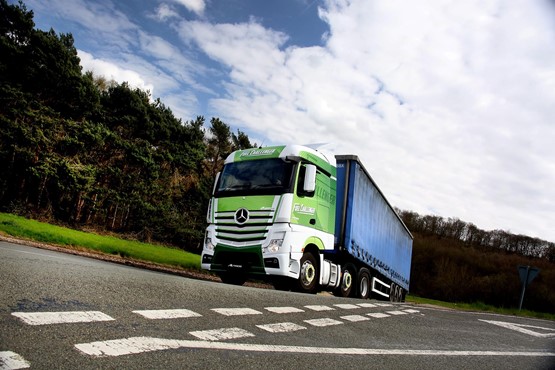
A combination of AI and autonomous technology, improved safety and more efficient powertrains will reduce costs for fleet operators in future.
“Around £70bn of operating profits will move from traditional to digital channels. There is a prize to be had,” he adds.
“The revolution will lower the cost of transport and distribution. The cost per mile of running a truck will reduce.
“Renewable energy is almost free, and we can use AI to deliver some autonomy. Labour costs from electric will be lower, and maintenance costs could be halved. Tyre and insurance costs will also be lower.
“Axa in The Future of Driverless Haulage predicts labour, fuel and insurance savings – and the fuel savings are just from AI, not from switching to electric.
“It isn’t science fiction. It’s merely a question of how we grab hold of this opportunity and bring these developments to market.”
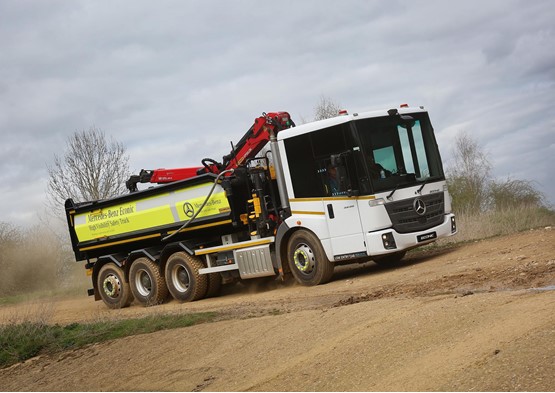
Connecting vehicles
According to James Collins, district manager at Mercedes-Benz Trucks, connected vehicles and services will radically transform the transport sector and open new opportunities.
“Connected telematics platforms (CTPs) will become part of all vehicles with positions located by GPS, proximity to other CTPs, and connected to dealers,” he said.
“Software updates will be able to take place during driver breaks when the vehicle is switched off.”
He also referred to successful trials by Mercedes-Benz Trucks using ‘platooning’, where autonomous trucks follow a course set by the lead vehicle, aware of other road users and running in close proximity on the motorway.
“Platooning has already taken place in Stuttgart, and has been very successful,” he said. “For now, legislation is keeping back the extent of autonomous technology.
"Level three and level four are already being developed, but we don’t think that level five is possible right now.
READ MORE: Northside named Mercedes-Benz Trucks Dealer of the Year for second year running
“Platooning alone could reduce CO2 emissions by 10%. Currently legislation governs the minimum gap of 15m apart the truck must maintain, but they could be run as close as 5m apart should laws be changed.
“Already they occupy less load space than unconnected trucks, and we have the potential to reduce this further.
“We’re moving toward autonomous driving. The driver will have less involvement in the truck on the road, as we try to improve safety and reduce fatigue.”
Mercedes-Benz Trucks featured autonomous emergency braking technology well ahead of European legislation, and include pedestrian detection with a wide angle radar at lower speeds.
Developing the low-cab entry Econic, with 180-degree visibility at road level, and easy access to an inward-opening kerbside door for the driver also illustrates Mercedes-Benz’s commitment to practical safety measures.
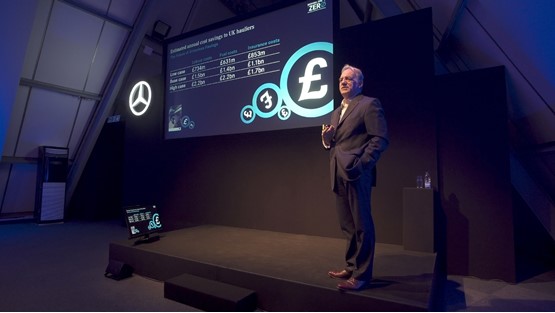
Electrification
“We’re not naïve about electrification,” said Collins. “It shifts emissions elsewhere, but it makes cities cleaner while giving us the opportunity to clean up the power network, and diesel emissions will continue to be the focus of attention in these areas.”
Five cities in the UK are preparing their own clean air zones in addition to London. They are on the road to becoming an ultra-low emission zone.
“Businesses have pressures to respond to consumers,” says Collins, “And the cost of running trucks that don’t meet Euro 6 will increase in the London emission zones.”
And, while other brands are often creating headlines around electric vehicles, Collins said Mercedes-Benz Trucks is in advanced stages of bringing vehicles to market.
READ MORE: New owners take over Mercedes-Benz Trucks dealer Sparshatts
“Tesla has talked about its electric truck, but it’s not here yet,” he said. “Tesla benefits from being in focus as a pioneer with its truck, but it has sold no vehicles yet.
“We already have the Fuso eCanter on the road, and it will be in production in 2019.”
The eCanter offers a carrying capacity of almost 4.5 tonnes, just 200kg short of the diesel version.
"It has a range of up to around 60 miles fully laden, which, according to officials at Mercedes-Benz Trucks, is more than sufficient for the majority of customers interested in the vehicle.
Efficient freight
Collins said distribution companies will be able to offer unoccupied load space to organisations that don’t need a full load, to ensure optimisation of cargo capacity on vehicles.
He said: “Technology is already available to share unoccupied load space on vehicles.
"Companies could advertise empty space on trucks, advertising the size of the space with photos to help illustrate it, and the destination of the vehicle using apps for others to use, making logistics more efficient.”
















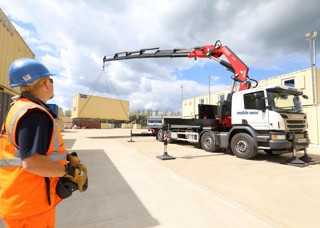

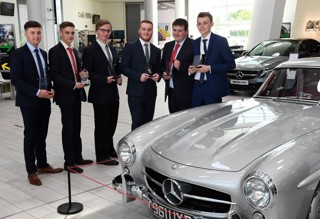
Login to comment
Comments
No comments have been made yet.